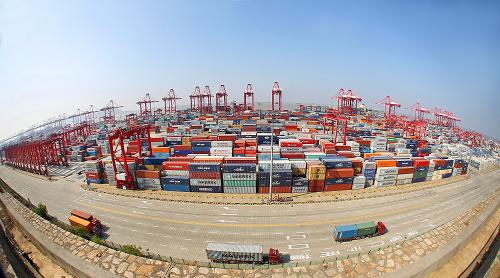Reforming the business-government relationship
- By Zhang Lijuan
 0 Comment(s)
0 Comment(s) Print
Print E-mail China.org.cn, February 18, 2014
E-mail China.org.cn, February 18, 2014
The establishment of the Shanghai Pilot Free Trade Zone in 2013 is the most tangible piece of evidence for China's further economic reform in the coming decade. The top leadership has pledged to give markets a "decisive" role in guiding fundamental institutional change in China by forming a new and more efficient type of business-government relationship.
|
|
|
The Yangshan Free Trade Port in Shanghai Free Trade Zone. [Xinhua photo] |
Interestingly enough, in the most recent State of the Union address, President Obama said, "The American people do not expect the government to solve every problem." But this cannot be said in China. On the contrary, it can be argued that the Chinese people do expect the government to solve every problem. It does not sound right, but is true. Historically, the Chinese people have always been steadfast believers in "big and strong government."
Since China's "open door" policy was introduced in the late 1970s, China has embraced market economy and open trade. No one can deny the dominant role that markets have played in making the miracle of China's economic development possible. The fact is, the open door policy has relaxed or removed administrative processes and procedures restricting business registration. It has served as a motivator for government to reposition itself. Now, with the Shanghai Pilot Free Trade Zone, the Chinese government intends to further balance business and government relations.
However, the Chinese authorities are facing some formidable challenges. The key challenge is not about how big the government is, but how much it should interfere in free markets. Under an ideal "Free Enterprise" system, business-government relationships are horizontal, which means the government serves the needs of private businesses and creates the most competitive environments, mostly rules and regulations, for business practices.
However, we should not expect China to adopt the ideal model of a "Free Enterprise" system in the short run, although we do hope to see Chinese institutions that can be characterized as "Free Enterprises." This should ensure that the government plays a minimal role in business development, but the maximum role in perfecting rules and regulations for sustainable and beneficial business operations.
Theory tells us that free enterprise systems are the best option for a market economy and a horizontal business-government relationship works better for economic development. However, China is an exception to the theory. The Chinese government has to be ready for possible market failures, social frustrations, and business abuses in serving the long-term interests of both its economic growth rate and its people's wealth and wellbeing. The Chinese government must still engage with leadership and take actions to solve serious problems involving water and air pollution, food safety and financial stability.
We should not be surprised if it takes years to transform from a vertical business-government relationship based economy to one on a new pro-free market, pro-competitive business performance basis with horizontal business government relationships. As long as the reform can begin, China will find a way to make it happen, sooner or later.
The author is a columnist with China.org.cn. For more information please visit: http://www.china.org.cn/opinion/zhanglijuan.htm
Opinion articles reflect the views of their authors, not necessarily those of China.org.cn.
Follow China.org.cn on Twitter and on Facebook to join the conversation.







Go to Forum >>0 Comment(s)